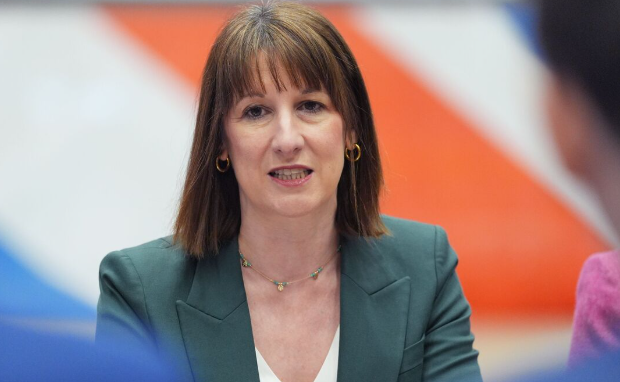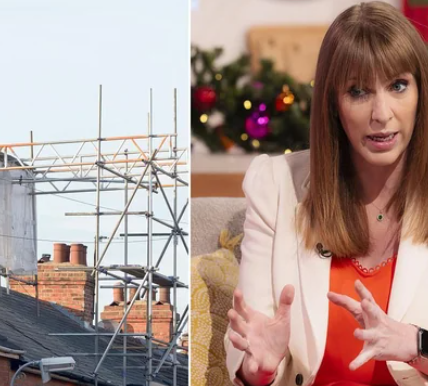Britain in a black hole: Rachel Reeves is forced to admit UK economy is flat-lining as she desperately slashes welfare payments among £15bn of cuts in make-or-break Spring Statement_Nhy
Rachel Reeves is laying out a wave of spending cuts today as she battles to balance the government’s books amid stalling growth.
The Chancellor stressed the grim realities facing the country as she delivered her Spring Statement to the Commons, arguing the ‘world has changed’.
She said she was ‘proud’ of her track record despite appearing to have a £15billion black hole in the finances to fill, after her huge tax-and-spend Autumn Budget was followed by an economic slowdown.
The OBR watchdog is set to slash growth forecasts in half, to around 1 per cent this year, as well as warning that living standards will stagnate for the rest of the decade.
The gloomy picture puts Ms Reeves on track to break her own ‘fiscal rules’, while she has signalled that the shortfall will be made up from spending cuts instead of even more tax rises at this stage.
Meanwhile, she has suffered another major setback as it emerged the OBR has rejected her claimed £5billion savings from benefits.
Instead they have been valued at more like £3billion – sparking a frantic last-ditch effort to find more cuts despite mounting fury from Labour MPs. Another £500million is apparently being trimmed from welfare, with the rest from other areas.
The bungled process triggered an extraordinary blame game, with claims late tweaks meant the proposals were not given to the OBR in time before they were laid out to the Commons by Liz Kendall last week.
On a day that could define the Labour government:
- There was a glimmer of good news for Ms Reeves as headline CPI inflation eased to 2.8 per cent – slightly lower than had been pencilled in by analysts;
- The government is facing renewed unrest on Labour benches over ‘austerity’ and benefits cuts, with whispers about ministers resigning;
- Keir Starmer insisted the government will go ‘further and faster’ on the economy after a ‘decade of stagnation’, saying he has ‘full confidence in the Chancellor’.

Chancellor Rachel Reeves stressed the grim realities facing the country as she delivered her Spring Statement to the Commons, arguing the ‘world has changed’

The OBR previously estimated that growth would be around 2 per cent this year

Public sector borrowing has been running above the OBR’s forecasts from October

At PMQs before the statement Keir Starmer insisted the government will go ‘further and faster’ on the economy

The OBR is said to have batted away the government’s estimate that reforms of work and disability handouts can curb £5billion from costs. Pictured, Work and Pensions Secretary Liz Kendall arrives at Cabinet today
The package – formally signed off by Cabinet this morning – had originally been scheduled as a routine update on the public finances.
But the Tories claim it is now effectively an ‘Emergency Budget’ with the government needing a huge change in strategy.
Ms Reeves has pre-announced plans to tell Whitehall departments to cut administrative budgets by 15 per cent, expected to save £2.2billion a year by 2029-30.
Real-terms increases in departmental budgets are set to be scaled back sharply, although specific decisions will not be made until the Spending Review is finalised in June.
In a thinly veiled swipe at Donald Trump, the Chancellor tried to blame global challenges for the British economy’s stuttering performance on her watch.
‘We can see that the world is changing, and part of that change is increases globally in the cost of government borrowing – and Britain has not been immune from those challenges,’ she said.
But a damaging poll has revealed that most voters no longer believe Ms Reeves’ economic claims – and are increasingly blaming her for the country’s financial woes.
The More in Common survey found more than half of voters (53 per cent) said Labour lied about its economic plans to win power and ‘always knew they weren’t going to keep to these promises’.
Just 13 per cent say Labour has stuck to its pledges on the economy. Voters are also tired of Labour’s constant attempts to blame the last Conservative government, with only 30 per cent saying they believe the Chancellor has been honest about the scale of the fiscal challenge she inherited.
More than half of voters think Labour is spending too much time blaming the Tories. Some 31 per cent now blame Labour for Britain’s growth crisis, compared with 27 per cent blaming the Conservatives and 18 per cent citing global events.
In its October forecast, the OBR expected GDP to grow by 2 per cent in 2025 and 1.8 per cent in 2026. Those figures already looked optimistic compared to other bodies.

Rachel Reeves has suffered a major setback even before her Spring Statement today with the Treasury watchdog rejecting her claims for savings from benefits

The rate of Consumer Prices Index inflation fell to 2.8%n February from 3% in January
The Bank of England halved its growth forecast for the UK economy in 2025 to 0.75 per cent in February, and earlier this month the OECD cut its 2025 forecast from 1.7 per cent to 1.4 per cent.
Lower-than-expected growth will lead to smaller tax receipts than had previously been budgeted for.
The latest official borrowing figures, for February, were £4.2billion higher than had been forecast by the OBR and over the year the gap is more like £20billion.
Ms Reeves’ self-imposed rule to meet day-to-day spending at the end of the five-year forecast through receipts rather than borrowing was forecast to be met with £9.9billion of headroom to spare in the OBR’s October assessment.



